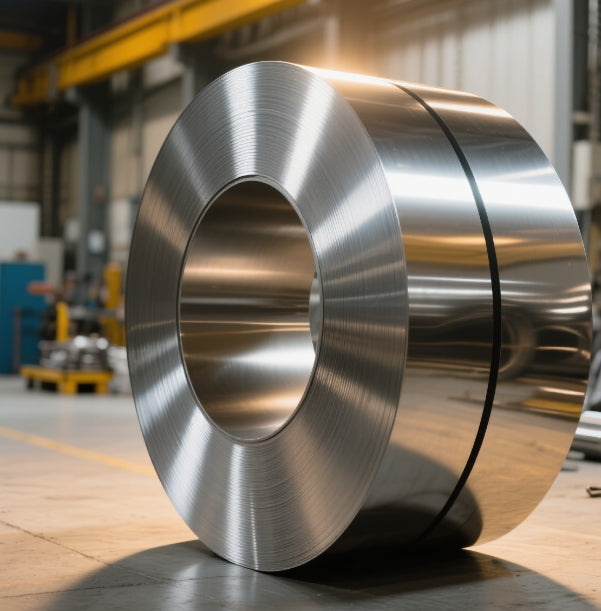StockSteel
Durable Stainless Steel Coil | 201 304 316L Types
Durable Stainless Steel Coil | 201 304 316L Types
Couldn't load pickup availability
Premium Durable Stainless Steel Coil: Grades 201, 304, 316L
Industrial-Grade Corrosion Resistance & Versatility
Product Overview
Our stainless steel coil series (Grades 201, 304, 316L) combines exceptional durability, corrosion resistance, and mechanical strength. Ideal for stainless steel heating coil systems, stainless steel coil tubing, and structural applications, these coils undergo precision cold rolling and annealing to ensure uniformity and performance in extreme environments.
Detailed Specifications
| Parameter | Grade 201 | Grade 304 | Grade 316L |
|---|---|---|---|
| Thickness (mm) | 0.1–3.0 | 0.1–6.0 | 0.1–4.0 |
| Width (mm) | 100–1250 | 100–2000 | 100–2000 |
| Hardness (HV) | ≤105 (Annealed) | ≤90 (Annealed) | ≤95 (Annealed) |
| Surface Finish | 2B, BA, No.4, HL | 2B, BA, 8K, Mirror | 2B, BA, No.4 |
| Tensile Strength (MPa) | ≥535 | ≥520 | ≥520 |
| Yield Strength (MPa) | ≥245 | ≥205 | ≥205 |
| Elongation (%) | ≥30 | ≥35 | ≥35 |
| Standards | ASTM A240, JIS G4304 | ASTM A240, EN 10088 | ASTM A240, DIN 17440 |
| Certifications | ISO, SGS, BV | ISO, SGS, BV | ISO, SGS, BV |
Notes: Custom widths (up to 2,000mm) and hardness levels (1/4 Hard to Full Hard) available.
In-Depth Performance Analysis
-
Tensile Strength
- Grade 201: Minimum tensile strength of 535 MPa, optimized for structural components requiring high stress resistance (e.g., automotive trim, roofing).
- Grade 304/316L: Exceeds 520 MPa, ideal for stainless steel coil tubing in chemical processing and heat exchangers due to enhanced ductility.
-
Bend Strength & Formability
- All grades support tight-radius bending (180° without cracking) after annealing. Grade 316L’s molybdenum content (2–3%) enables superior performance in acidic environments.
-
Weight Calculation Formula
-
Density Values:
- Grade 201: 7.80 g/cm³
- Grade 304: 7.93 g/cm³
- Grade 316L: 7.98 g/cm³
-
Density Values:
-
Material Identification System
- ASTM/EN Prefix: SUS (JIS), AISI (USA), e.g., "SUS304" for Japanese standards.
- Surface Marking: Laser-etched batch numbers for traceability.
Why Stainless Steel Coils Corrode?
Despite inherent corrosion resistance, stainless steel coil degradation can occur due to:
- Chloride Exposure: Coastal or de-icing salt environments cause pitting in Grade 304; Grade 316L is recommended for such conditions.
- Galvanic Corrosion: Direct contact with carbon steel accelerates oxidation. Insulation with non-conductive gaskets is critical.
- High-Temperature Oxidation: Prolonged exposure above 800°C depletes chromium oxide layers. Stainless steel heating coil systems require Grade 310S for >1,000°C operations.
- Mechanical Damage: Scratches or weld splatter disrupt passive layers, enabling rust initiation. Pickling/passivation restores protection.
Application Scenarios
- Stainless Steel Heating Coil: Grade 304/316L for boilers, industrial heaters (resists scaling up to 870°C).
- Stainless Steel Coil Tubing: Seamless Grade 316L coils for chemical transfer, medical gas lines.
- Architectural & Automotive: Grade 201 for cost-effective trims; Grade 430 for catalytic converters.
Technical Support & Quality Assurance
- Testing Protocols: Eddy current flaw detection, hardness (Rockwell B), salt spray testing per ASTM B117.
- Packaging: Wooden crates + PVC film coating to prevent transit corrosion.
- Lead Time: 15–30 days (custom orders); 7 days for standard stock.
Why Choose Our Stainless Steel Coils?
-
Zero Compromise on Material Integrity
- Exclusive sourcing from TISCO, POSCO, and Baosteel mills. Full traceability with mill test certificates (EN 10204 3.1/3.2).
-
Precision Customization
- Laser cutting, slitting, and edge-milling for stainless steel coil tubing with ±0.02mm tolerance.
-
Corrosion Warranty
- 10-year guarantee against rust perforation (excludes mechanical damage).
-
Global Compliance
- AD2000, PED, and ASME certifications for pressure vessel applications.
-
Sustainable Manufacturing
- 95% recycled content; ISO 14001-certified production.

